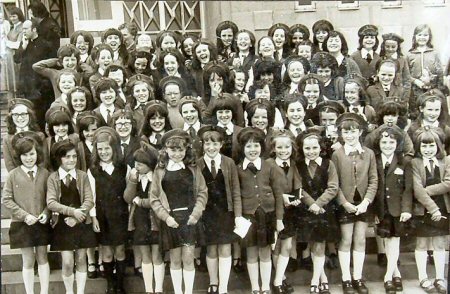If our garment-mak
If our garment-making at St Joseph‘s Primary School fell somewhat short of Dior standards, it is also true that our cookery could scarcely be termed ‘cordon bleu’.
One day a week, armed with ‘ingredients’ brought from home, we trooped over to the cookery room that was presided over by Sister Immaculata.
1976 St Joseph’s Communion Choir
There we attempted to produce such delights as
Rock cakes, that could have constituted a firm foundation for the Pyramids;
Potato Soup which for all the world tasted of warm milk;
Egg Custard, formed of course from dried eggs, and
Soda Farls, which came out grey and inedible from too much kneading of grubby fingers.
Despite the food shortages of the time, these and other equally unforgettable dishes usually ended up in the dustbin. Cookery only became a recognisable art when I moved to second level education. This rite of passage was achieved by passing The Qualifying.
Universally known as the Eleven Plus, this exam was introduced as a result of the 1947 Education Act. The aim was to open access to secondary education to a much wider range of children than before. Prior to that grammar school education was fee-paying. The selection process began long before the sitting of the exam, when pupils were selected by the nuns as being worthy of sitting the exam. Then they were expected to work hard and get good results.
In those days just after the War many people regarded grammar school education as just a waste of time. Most families didn’t have enough money and children could leave school and get a job at fourteen, to supplement meagre family income.
… more …
